-
01-01-2016
Peritoneal dialysis: family care for chronic kidney disease patients in home-based treatment
Revista Brasileira de Enfermagem. 2016;69(6):1172-1178
Abstract
Peritoneal dialysis: family care for chronic kidney disease patients in home-based treatment
Revista Brasileira de Enfermagem. 2016;69(6):1172-1178
DOI 10.1590/0034-7167-2016-0262
Views0See moreABSTRACT
Objective:
to propose a family care model for patients with chronic kidney disease in peritoneal dialysis based on evidence indicated by family members.
Method:
this was a qualitative descriptive study that used the Convergent Care Research method. It was conducted at a state hospital in Rio de Janeiro, including techniques for recording individual interviews and consisted of a group of 19 study participants. Data were analyzed according to the stages proposed by the method, generating a category that used a cultural question as the basis for patient care resulting in a proposal for home-based family care.
Results:
the patient care model proposed includes dialogue and reflection in sharing the knowledge of “professional” and “popular” systems, aiming to improve the patient’s quality of life.
Conclusion:
family members were able to promote care based on cultural preservation, accommodation and repatterning, as proposed by Leininger’s Sunrise Model.
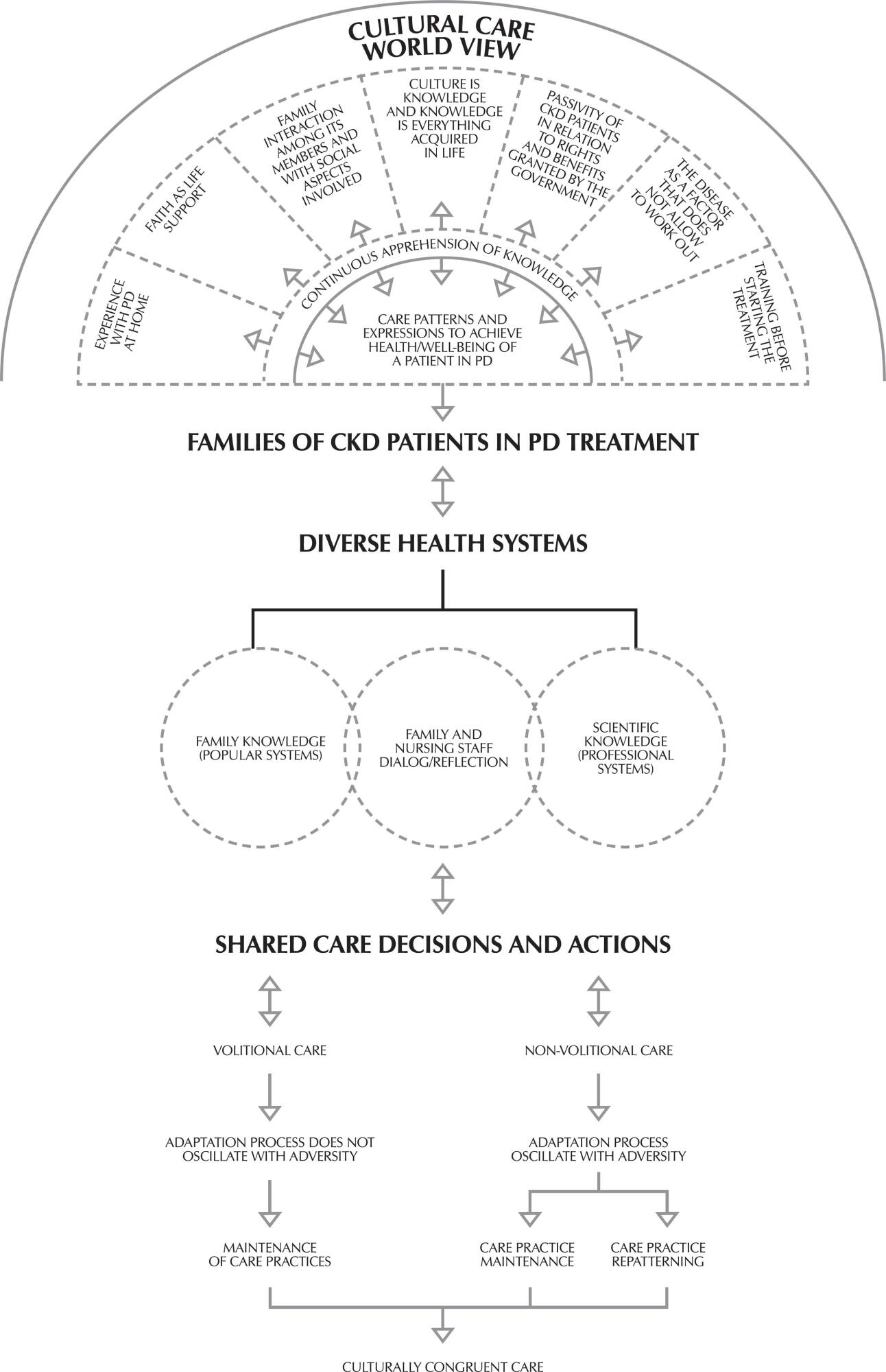
-
01-01-2016
Technology for self-care for ostomized women’s sexual and reproductive health
Revista Brasileira de Enfermagem. 2016;69(6):1164-1171
Abstract
Technology for self-care for ostomized women’s sexual and reproductive health
Revista Brasileira de Enfermagem. 2016;69(6):1164-1171
DOI 10.1590/0034-7167-2016-0302
Views0See moreABSTRACT
Objective:
to validate the technology of printed booklets on self-care for ostomized women’s sexual and reproductive health.
Method:
a methodological study was performed with a focus on the construction and validity of a printed booklet. The content of this booklet was validated by 11 specialist judges/nurses, according to a Content Validity Index (CVI) equal to or higher than 0.80. Appearance was validated by nine ostomized women, according to an assessment of the difficulty and convenience of the educational material.
Results:
the booklet was validated by specialists, with an overall mean CVI equal to 0.87. Moreover, the target population showed 100% of agreement in terms of the adequacy of organization, writing style, appearance and motivation of this booklet.
Conclusion:
the educational technology in question was validated according to content and appearance, thus representing an adequate, reliable and easily understandable resource to acquire knowledge about self-care for ostomized women’s sexual and reproductive health.

-
01-01-2016
Short-course therapy for tuberculosis: a discourse analysis
Revista Brasileira de Enfermagem. 2016;69(6):1154-1163
Abstract
Short-course therapy for tuberculosis: a discourse analysis
Revista Brasileira de Enfermagem. 2016;69(6):1154-1163
DOI 10.1590/0034-7167-2016-0330
Views0See moreABSTRACT
Objective:
to analyze the meanings produced by nursing professionals in the directly observed treatment (DOT) for tuberculosis (TB) in the city of São Paulo.
Method:
this is a qualitative study, conducted in March and April 2014 through semi-directed interviews with nine nurses. The empirical material produced was analyzed according to the theoretical and methodological support of the Discourse Analysis of French matrix.
Results:
results have emerged as three discursive blocks: conditions for the production of tuberculosis control practices; production conditions facilitating the treatment of tuberculosis; and production conditions hindering the treatment of tuberculosis.
Conclusion:
these professionals’ words produce different meanings, which suggest that the practices of nursing professionals allow the patient to search for a cure, which is reinforced by incentives of a social nature, but permeated by the vicissitudes that are circumscribed in the ill person’s everyday production conditions.
-
00-00-0000
Representações cotidianas de jovens sobre a periferia
. ;
Abstract
Representações cotidianas de jovens sobre a periferia
. ;
Views0RESUMOObjetivos:compreender as representações cotidianas de jovens sobre a periferia, com a finalidade de compor os temas para programas midiáticos de educação sobre drogas.Método:abordagem marxista, com pesquisa-ação emancipatória e participação em oficinas de 13 jovens de uma escola pública da periferia de São Paulo.Resultados:entre os jovens há representações cotidianas contraditórias sobre o papel do Estado, que, […]See more -
01-01-2016
Aids in the elderly: reasons that lead to late diagnosis
Revista Brasileira de Enfermagem. 2016;69(6):1140-1146
Abstract
Aids in the elderly: reasons that lead to late diagnosis
Revista Brasileira de Enfermagem. 2016;69(6):1140-1146
DOI 10.1590/0034-7167-2016-0370
Views0See moreABSTRACT
Objective:
to investigate elderly living with HIV/Aids and health professionals, what are the reasons that lead to late diagnosis of HIV infection in the elderly.
Method:
prospective, qualitative study, conducted at a specialized outpatient clinic with elderly living with HIV/Aids, diagnosed age over 60 years and in the Family Health Strategy units with nurses and physicians. Data were collected through interviews and verified by content analysis, using the theoretical framework of vulnerability.
Results:
a total of 11 elderly, 11 nurses and 12 physicians participated in the study. Three empirical categories emerged: the late diagnosis of HIV happens against the health service; invisibility of the sexuality of the elderly; and weaknesses in the anti-HIV serology request for the elderly.
Conclusion:
there are health professionals who see the elderly as asexual, causing the diagnosis of HIV to happen in the secondary and tertiary service instead of primary care.
-
01-01-2016
Storytelling: a care technology in continuing education for active ageing
Revista Brasileira de Enfermagem. 2016;69(6):1132-1139
Abstract
Storytelling: a care technology in continuing education for active ageing
Revista Brasileira de Enfermagem. 2016;69(6):1132-1139
DOI 10.1590/0034-7167-2016-0390
Views0See moreABSTRACT
Objective:
assessing relevance and effectiveness of care/educational technology in the form of “storytelling” as a strategy in the cultivation of active ageing (AA) for elderly users of a Basic Health Unit (BHU), from the Amazon region.
Method:
convergent care research (CCR) held in a BHU in Belém, state of Pará, with eight elderly ladies for testing this technology. An active ageing assessment questionnaire and WHOQOL-BREF – quality of life assessment were applied. After training with a view to continuing education, elderly ladies told stories for an audience that addressed the question: “What did you learn from it for your life?”
Results:
tThe popular stories elicited reactions from which the following categories emerged: solidarity; respect for the other; imagination, dreams, hopes and culture of the Amazonian. This practice had a positive result, producing changes in the quality of life of the elderly, particularly in the psychological domain.
Conclusion:
“storytelling” proved to be an innovative technology, a relevant and effective resource in health education, especially for active ageing.

-
01-01-2016
Nurse care practices in the Family Health Strategy
Revista Brasileira de Enfermagem. 2016;69(6):1124-1131
Abstract
Nurse care practices in the Family Health Strategy
Revista Brasileira de Enfermagem. 2016;69(6):1124-1131
DOI 10.1590/0034-7167-2016-0273
Views1See moreABSTRACT
Objective:
to analyze the practices of care of nurses working in teams of the family health strategy, from the perspective of users.
Method:
qualitative research conducted with 34 registered users in seven family health units of a municipality of Bahia from June to December 2014. The results were organized by the technique of content analysis.
Results:
users showed satisfaction with the nurse care due to listening, warmth and resolution of their health needs, despite the emphasis on procedures and programs targeted to populational groups. The dissatisfaction stems from the authoritarian, prescriptive and inflexible attitude in the nurse care. It was also emphasized that the home visits are directed to the bedridden and more restricted to preventive actions. Educational activities occur during the nursing consultation and in the health unit.
Conclusion:
there is urgent need of redefining the care as a structuring axis of the nurse practice.
-
01-01-2016
Interdisciplinary care praxis in groups of people living with fibromyalgia
Revista Brasileira de Enfermagem. 2016;69(6):1115-1123
Abstract
Interdisciplinary care praxis in groups of people living with fibromyalgia
Revista Brasileira de Enfermagem. 2016;69(6):1115-1123
DOI 10.1590/0034-7167-2016-0279
Views0See moreABSTRACT
Objectives:
to analyze the integrated community therapy model for the empowerment of people living with fibromyalgia and discuss the impact of this interdisciplinary intervention in the health-disease process and self-care.
Method:
a participatory-approach qualitative study, developed in 2015 with 11 participants at the Laboratory of Physiology Applied to Physical Education of the Rio de Janeiro State University, RJ. Data production comprised World Café, participant observation and semi-structured interview. The analysis was performed according to Bardin, through data triangulation in dialogue with the relevant literature.
Results:
the integrated community therapy group is a driving force in building and expanding knowledge about fibromyalgia and in self-care empowerment.
Conclusion:
this group strategy proved to be an interdisciplinary praxis tool that enables the development of solidary care networks. Thus, shared knowledge was generated, transformed into a listening and reflection environment to manage personal and family obstacles.
-
06-14-2024
Duração e qualidade do sono da equipe de enfermagem brasileira que trabalha em turnos
Revista Brasileira de Enfermagem. 2024;77(2):e20230167
Abstract
Duração e qualidade do sono da equipe de enfermagem brasileira que trabalha em turnos
Revista Brasileira de Enfermagem. 2024;77(2):e20230167
DOI 10.1590/0034-7167-2023-0167
Views0See moreRESUMEN
Objetivo:
analizar la duración y calidad del sueño en profesionales de enfermería que trabajan por turnos.
Método:
investigación analítica, transversal, realizada entre septiembre de 2017 y abril de 2018, en un hospital público del sur de Brasil, con el equipo de enfermería. Se utilizó el cuestionario sociolaboral y de síntomas de salud, la Escala de Somnolencia de Epworth y el Índice de Calidad del Sueño de Pittsburgh. Los datos se presentan como estadística descriptiva e inferencial, análisis bivariado y regresión logística binaria.
Resultados:
participaron 308 profesionales de enfermería, con predominio de sueño prolongado, ausencia de somnolencia y mala calidad del sueño. La duración corta del sueño (<6 h) se asoció con turnos de día y mala calidad del sueño. La calidad del sueño se asoció con la presencia de somnolencia diurna excesiva y con el trabajo diurno.
Conclusión:
los turnos de trabajo, el insomnio y la cefalea fueron los principales factores relacionados con la falta de sueño de los profesionales de enfermería. Los resultados pueden justificar el desarrollo de investigaciones de intervención para la salud de los trabajadores.
-
ORIGINAL ARTICLE06-14-2024
Sleep duration and quality of Brazilian nursing staff who work in shifts
Revista Brasileira de Enfermagem. 2024;77(2):e20230167
Abstract
ORIGINAL ARTICLESleep duration and quality of Brazilian nursing staff who work in shifts
Revista Brasileira de Enfermagem. 2024;77(2):e20230167
DOI 10.1590/0034-7167-2023-0167
Views0See moreABSTRACT
Objective:
to analyze sleep duration and sleep quality in nursing professionals who work in shifts.
Method:
this is a cross-sectional, analytical research, carried out between September 2017 and April 2018, at a public hospital in southern Brazil, with the nursing team. A socio-occupational and health symptoms questionnaire, the Epworth Sleepiness Scale, and the Pittsburgh Sleep Quality Index were used. Data are presented as descriptive and inferential statistics, bivariate analysis, and binary logistic regression.
Results:
participants were 308 nursing professionals with a predominance of long-term sleep, absence of drowsiness, and poor sleep quality. Short-term sleep (<6h) was associated with day shift and poor sleep quality. Sleep quality was associated with presence excessive daytime sleepiness and work day shift.
Conclusion:
work shift, insomnia and headache were the main factors related short-term sleep for nursing professionals. The results may justify the development of intervention research for workers’ health.
-
ORIGINAL ARTICLE06-14-2024
Translation and Cross-Cultural Adaptation of the LYMPH-ICF Instrument for Lymphedema into Portuguese/Brazil
Revista Brasileira de Enfermagem. 2024;77(2):e20230137
Abstract
ORIGINAL ARTICLETranslation and Cross-Cultural Adaptation of the LYMPH-ICF Instrument for Lymphedema into Portuguese/Brazil
Revista Brasileira de Enfermagem. 2024;77(2):e20230137
DOI 10.1590/0034-7167-2023-0137
Views0See moreABSTRACT
Objective:
The aim of this study is to cross-culturally adapt the Lymphoedema Functioning, Disability and Health Questionnaire Lymphoedema (LYMPH-ICF) instrument into Brazilian Portuguese and conduct a pilot application (n = 10), without psychometric pretensions.
Method:
Methodological research was conducted, following the steps of translation, synthesis, back-translation, and evaluation by the expert committee. Two translators, two back-translators, and twelve professionals participated in the expert committee. A pretest was carried out with 10 patients with secondary lymphedema due to breast cancer. The degree of agreement was determined by the content validity coefficient.
Results:
It was necessary to modify 8 out of the 29 questions comprising the questionnaire, which exhibited idiomatic disagreement. However, despite these changes, there were no indications of impairments, as content reliability was achieved through a validity coefficient of 0.90.
Final Considerations:
The instrument was successfully translated and cross-culturally adapted for Brazil with a high level of agreement.
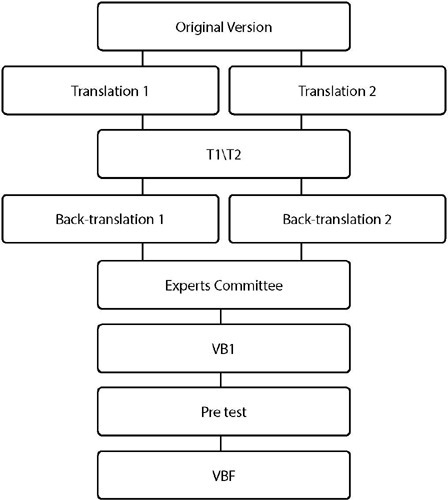
-
ORIGINAL ARTICLE05-27-2024
Fall Tailoring Interventions for Patient Safety Brazil Program: an evaluability study in a teaching hospital
Revista Brasileira de Enfermagem. 2024;77(2):e20230348
Abstract
ORIGINAL ARTICLEFall Tailoring Interventions for Patient Safety Brazil Program: an evaluability study in a teaching hospital
Revista Brasileira de Enfermagem. 2024;77(2):e20230348
DOI 10.1590/0034-7167-2023-0348
Views0See moreABSTRACT
Objectives:
to present the theoretical model, logic model, and the analysis and judgment matrix of the Fall TIPS Brazil Program.
Methods:
a qualitative, participatory research approach, in the form of an evaluability study, encompassing the phases (1) problem analysis; (2) program design, development, and adaptation to the Brazilian context; (3) program dissemination. Data were collected through document analysis and workshops.
Results:
through document analysis, workshops with stakeholders from the participating institution, and validation with key informants, it was possible to identify the program’s objectives, expected outcomes, and the target audience. This allowed the construction of theoretical and logic models and, through evaluative questions, the identification of indicators for the evaluation of the Fall TIPS Brazil Program.
Final Considerations:
this study has provided insights into the Fall TIPS program, the topic of hospital fall prevention, and the proposed models and indicators can be employed in the implementation and future evaluative processes of the program.
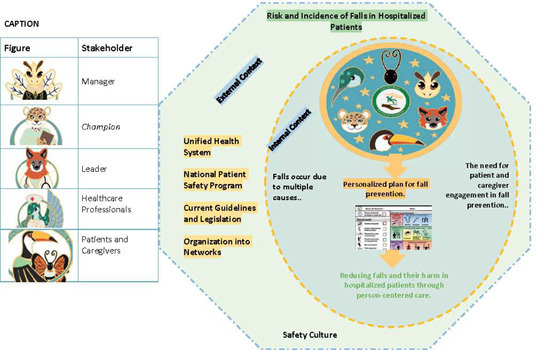
-
ORIGINAL ARTICLE05-27-2024
Nursing care protocol for critical users with tracheostomy under mechanical ventilation
Revista Brasileira de Enfermagem. 2024;77(2):e20230337
Abstract
ORIGINAL ARTICLENursing care protocol for critical users with tracheostomy under mechanical ventilation
Revista Brasileira de Enfermagem. 2024;77(2):e20230337
DOI 10.1590/0034-7167-2023-0337
Views0See moreABSTRACT
Objectives:
to develop and assess a nursing care protocol for critically ill users with tracheostomy under mechanical ventilation.
Methods:
a methodological study, developed through two phases, guided by the 5W2H management tool: I) target audience characterization and II) technology development.
Results:
thirty-four nursing professionals participated in this study, who presented educational demands in relation to care for critical users with tracheostomy, with an emphasis on standardizing care through a protocol and carrying out continuing education.
Final Considerations:
the creation and validity of new technologies aimed at this purpose enhanced the participation of nursing professionals and their empowerment in the health institution’s microsectoral actions and in macrosectoral actions, highlighting the need for public policies that guarantee the conduct of a line of care for users with tracheostomy.
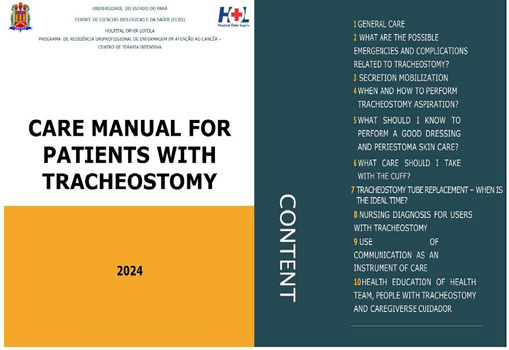
-
ORIGINAL ARTICLE05-27-2024
Assessment of educational technology in lactation physiology by health students
Revista Brasileira de Enfermagem. 2024;77(2):e20230252
Abstract
ORIGINAL ARTICLEAssessment of educational technology in lactation physiology by health students
Revista Brasileira de Enfermagem. 2024;77(2):e20230252
DOI 10.1590/0034-7167-2023-0252
Views0See moreABSTRACT
Objectives:
to assess the suitability, facilitators, and barriers of using a video clip for teaching lactation physiology to health students.
Methods:
a cross-sectional study was conducted with online data collection at a higher education institution, using the Assistive Technology Assessment Instrument and open-ended questions. The sample consisted of 88 students.
Results:
the video clip was deemed suitable in all attributes. Facilitators identified included attractiveness, musicality, and ease of access. Barriers noted were the music’s speed and the necessity for prior knowledge. The video clip achieved adequate scores for interactivity (1.71), purpose (1.77), relevance (1.64), and clarity (1.77). The overall average of the attributes was 1.72.
Conclusions:
the video clip can serve as an effective learning strategy to enhance hybrid education, potentially contributing to the promotion and support of breastfeeding. However, some barriers underscore the importance of prior knowledge for a complete understanding of the content.
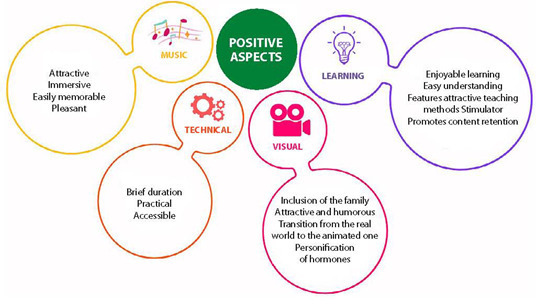
-
ORIGINAL ARTICLE05-27-2024
Technology for nursing care in a Maternal Intensive Care Unit: a methodological study
Revista Brasileira de Enfermagem. 2024;77(2):e20230202
Abstract
ORIGINAL ARTICLETechnology for nursing care in a Maternal Intensive Care Unit: a methodological study
Revista Brasileira de Enfermagem. 2024;77(2):e20230202
DOI 10.1590/0034-7167-2023-0202
Views0See moreABSTRACT
Objectives:
to develop and validate a nursing care plan in a Maternal Intensive Care Unit.
Methods:
a methodological study, developed in stages: integrative review; Nursing History construction; care plan restructuring; appearance and content validity by judges.
Results:
the history was organized into sections: Identification; Basic Human Needs; Physical Examination; and Assessment of Basic Human Needs. A care plan was restructured with 34 diagnoses, organized according to basic human needs. A satisfactory level of appearance validity of the history and care plan was obtained (Concordance Index varying between 86.3 and 100 for both instruments), and content validity with average indexes of 90.8 and 92.8, respectively. Thirty-four diagnoses, their interventions and nursing actions were consolidated.
Conclusions:
the instruments were considered relevant and pertinent in terms of appearance and content, and their use in the institution under study as well as in other similar services may be recommended.
-
05-13-2024
Metodologia qualitativa: considerações e singularidades sobre a implementação de intervenções centradas na pessoa
Revista Brasileira de Enfermagem. 2024;77(3):e770301
Abstract
Metodologia qualitativa: considerações e singularidades sobre a implementação de intervenções centradas na pessoa
Revista Brasileira de Enfermagem. 2024;77(3):e770301
DOI 10.1590/0034-7167.2024770301pt
Views0A investigação qualitativa em saúde permite a compreensão aprofundada de como a pessoa experiencia as diferentes transições de saúde, a relação com os profissionais de saúde e a passagem pelos diferentes ambientes de prática clínica. Concomitantemente, tem o potencial de suportar a tomada de decisão clínica dos profissionais e de empoderar o cidadão na sua […]See more
-
12-04-2023
A cronicidade e o seu impacto na saúde do trabalhador: uma chamada para ações concretas
Revista Brasileira de Enfermagem. 2023;76:e76suppl301
Abstract
A cronicidade e o seu impacto na saúde do trabalhador: uma chamada para ações concretas
Revista Brasileira de Enfermagem. 2023;76:e76suppl301
DOI 10.1590/0034-7167.202376suppl301pt
Views0A relação entre cronicidade e trabalho tem sido uma preocupação crescente na sociedade contemporânea. À medida que o número de doenças crônicas aumenta em todo o mundo, é fundamental compreender como essas condições impactam a saúde dos trabalhadores(). Neste editorial, exploraremos os impactos da cronicidade na saúde do trabalhador, destacando dados da Carga Global de […]See more -
12-04-2023
Chronicity and its impact on workers’ health: a call for concrete actions
Revista Brasileira de Enfermagem. 2023;76:e76suppl301
Abstract
Chronicity and its impact on workers’ health: a call for concrete actions
Revista Brasileira de Enfermagem. 2023;76:e76suppl301
DOI 10.1590/0034-7167.202376suppl301
Views0The relationship between chronicity and work has been a growing concern in contemporary society. As the number of chronic illnesses increases around the world, it is critical to understand how these conditions impact workers’ health(). In this editorial, we will explore the impacts of chronicity on workers’ health, highlighting data from the Global Burden of […]See more -
12-04-2023
General Law on Personal Data Protection and applicability to Nursing
Revista Brasileira de Enfermagem. 2023;76:e20230126
Abstract
General Law on Personal Data Protection and applicability to Nursing
Revista Brasileira de Enfermagem. 2023;76:e20230126
DOI 10.1590/0034-7167-2023-0126
Views0See moreABSTRACT
Objectives:
to reflect on the impacts of the General Personal Data Protection Law on Nursing practice.
Methods:
reflection article, through the intentional collection of materials relating to the topic.
Results:
legislation regulates confidentiality, processing and data sharing, requiring institutional protection measures. The nursing team is responsible for acting preventively, both in care and in the management role, in order to avoid the misuse of the patient’s personal data. The law allows academic research to be carried out as long as the purpose is clear, data collection occurs with an explicit purpose and data is anonymized.
Final Considerations:
although the General Personal Data Protection Law requires greater care in relation to data processing, it is established on precepts of good faith and respect for the rights of the individual, concepts aligned with the nursing code of ethics.

-
REVIEW12-04-2023
Supervision of professional nursing practice in Brazil: a scoping review
Revista Brasileira de Enfermagem. 2023;76:e20230077
Abstract
REVIEWSupervision of professional nursing practice in Brazil: a scoping review
Revista Brasileira de Enfermagem. 2023;76:e20230077
DOI 10.1590/0034-7167-2023-0077
Views0See moreABSTRACT
Objectives:
to map studies that analyze the audit process of nursing councils.
Methods:
this is a scoping review, anchored in the JBI framework, with the guiding question: what is the evidence of the audit process of legal practice of nursing by class councils (COFEN/COREN system)? The searches were carried out in October and November 2022 without limitation of language and year.
Results:
of the 9 selected studies, all are Brazilian and published from 2014 onwards. Among the topics addressed are the role, challenges, costs and difficulties in nurse auditors’ daily work process, in addition to the contribution of the audit sector in Brazil.
Conclusions:
the studies gathered discuss aspects related to costs, challenges and difficulties, but there is no focus on corrective, disciplinary and educational activities as well as little is said about the audit process, its reporting, referral and outcomes.

-
ORIGINAL ARTICLE12-04-2023
Overview of nursing ethics teaching in Brazilian public higher education institutions
Revista Brasileira de Enfermagem. 2023;76:e20220808
Abstract
ORIGINAL ARTICLEOverview of nursing ethics teaching in Brazilian public higher education institutions
Revista Brasileira de Enfermagem. 2023;76:e20220808
DOI 10.1590/0034-7167-2022-0808
Views0See moreABSTRACT
Objectives:
to outline the teaching of ethics in undergraduate Nursing programs in Brazilian public higher education institutions.
Methods:
descriptive and exploratory study, carried out through the documentary analysis of pedagogical projects of undergraduate Nursing programs in Brazil.
Results:
153 active undergraduate Nursing programs were found, of which 106 provide the pedagogical project. In addition to deontological teaching, the teaching of ethics was identified in a transversal way associated with themes such as Social Context, Hospital and Community Care, Pharmacology, Systematization of Nursing Care, Surgical Nursing, Epidemiology, Palliative Care, Management in Nursing, Diversity, Women’s, Children’s, Adolescent’s, Adult’s and Older People’s Health, and Mental Health.
Final Considerations:
the challenge in teaching nursing ethics is its integration with each action of caring, teaching and managing.

-
12-04-2023
La ética de la atención de enfermería a las personas transgénero
Revista Brasileira de Enfermagem. 2023;76:e20220797
Abstract
La ética de la atención de enfermería a las personas transgénero
Revista Brasileira de Enfermagem. 2023;76:e20220797
DOI 10.1590/0034-7167-2022-0797es
Views0See moreRESUMEN
Objetivos:
debatir sobre aspectos éticos en la atención de enfermería a personas transgénero.
Métodos:
estudio reflexivo fundamentado sobre los dilemas que se plantean en los cuidados de enfermería a personas transgénero. El relato se ha estructurado en torno a los cuatro principios bioéticos.
Resultados:
la atención sanitaria a las personas trans es compleja, transversal a muchos dispositivos y especialidades y longitudinal en el tiempo por lo que precisa de la actuación coordinada. Existe un marco ético en el que se encuadran los cuidados de enfermería que se precisan en la atención a este colectivo.
Consideraciones Finales:
la enfermera como agente de salud puede asumir diversas líneas generales en la atención a pacientes transgénero. Para ello, se debe brindar formación adicional no solo a los profesionales, también a los estudiantes de enfermería y de las demás ciencias de la salud.
-
12-04-2023
Ethical dilemmas at the end of life: a reflection from the Philosophical Perspective of Luigina Mortari
Revista Brasileira de Enfermagem. 2023;76:e20220759
Abstract
Ethical dilemmas at the end of life: a reflection from the Philosophical Perspective of Luigina Mortari
Revista Brasileira de Enfermagem. 2023;76:e20220759
DOI 10.1590/0034-7167-2022-0759
Views0See moreABSTRACT
Objectives:
to reflect on the ethical dilemmas involved in the care of patients at the end of their lives.
Methods:
this is a theoretical-reflective study based on the ethics of care proposed by Luigina Mortari.
Results:
discussing care involves addressing the ways of being inherent to human existence and understanding the unique characteristics of this condition. Ethical care constitutes an action driven by interest in the other and by the perception of their need. Ethical dilemmas are a part of end-of-life care, making it essential to maintain respectful assistance that considers the patient’s autonomy, using strategies for expressing their wishes, and ensuring continuous clear and empathetic communication among all those involved in providing care.
Final Considerations:
issues related to being, stemming from one’s reality of dependency and vulnerability, contribute to the emergence of ethical dilemmas present in care actions.
Search
Search in:
Nuvem de Tags
Adolescente (85) Atenção Primária à Saúde (239) COVID-19 (91) Criança (91) Cuidados de Enfermagem (269) Educação em Enfermagem (151) Educação em Saúde (139) Enfermagem (930) Enfermagem Pediátrica (86) Estudantes de Enfermagem (77) Estudos de Validação (131) Família (87) Idoso (208) Promoção da Saúde (99) Qualidade de Vida (104) Saúde do Trabalhador (86) Saúde Mental (145) Saúde Pública (82) Segurança do Paciente (150) Tecnologia Educacional (100)



